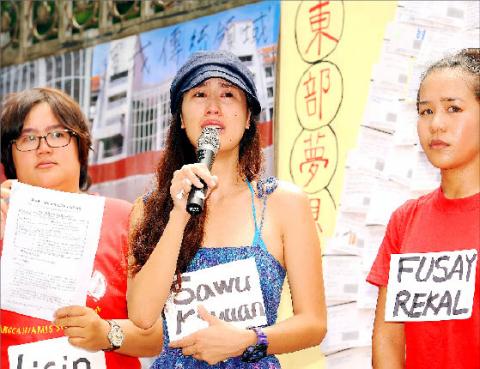Amis Aborigines yesterday protested outside the legislature against a proposed development law and development projects in traditional Amis areas along the east coast, plans for which they claimed local residents were not consulted.
“We demand that Aborigines be consulted and involved in any development projects undertaken on traditional Aboriginal lands as the Aboriginal Basic Act (原住民族基本法) stipulates,” Kawlo Iyun Pacidal, a member of the Amis Defense Alliance, told reporters at the demonstration.
“We also demand that a co-management mechanism between locals and the operator of any development projects be established,” Pacidal said. “Based on the first two demands, we are asking for a halt to the planned Baosheng [Aquarium Park] project.”

Photo: Chu Pei-hsiung, Taipei Times
Four tourism facilities, including theme parks, resorts and hotels, are to be built around the Sansiantai (三仙台) area in Taitung County, a traditional Amis domain known by the tribe as “Pisiliang.”
The Baosheng project has attracted special attention because construction was scheduled to start on Monday, though it was postponed indefinitely because of strong opposition from local residents, said Namoh Nofu Pacidal, another member of the Amis Defense Alliance.
“The developer [of the Baosheng project] called a meeting with local residents on May 30, but did not allow the locals to talk and the purpose of the meeting was only to announce that construction was to begin within a week,” Namoh Nofu Pacidal said. “When they made their presentation, the locals requested Amis interpretation because many elders could not understand Mandarin, but the request was rejected.”
While the situation remains unresolved, the alliance called on the government and developers to abide by the Aboriginal Basic Act, and refrain from development projects without consent from Aborigines.

ANOTHER EMERGES: The CWA yesterday said this year’s fourth storm of the typhoon season had formed in the South China Sea, but was not expected to affect Taiwan Tropical Storm Gaemi has intensified slightly as it heads toward Taiwan, where it is expected to affect the country in the coming days, the Central Weather Administration (CWA) said yesterday. As of 8am yesterday, the 120km-radius storm was 800km southeast of Oluanpi (鵝鑾鼻), Taiwan’s southernmost tip, moving at 9kph northwest, the agency said. A sea warning for Gaemi could be issued tonight at the earliest, it said, adding that the storm is projected to be closest to Taiwan on Wednesday or Thursday. Gaemi’s potential effect on Taiwan remains unclear, as that would depend on its direction, radius and intensity, forecasters said. Former Weather Forecast

As COVID-19 cases in Japan have been increasing for 10 consecutive weeks, people should get vaccinated before visiting the nation, the Centers for Disease Control (CDC) said. The centers reported 773 hospitalizations and 124 deaths related to COVID-19 in Taiwan last week. CDC Epidemic Intelligence Center Director Guo Hung-wei (郭宏偉) on Tuesday said the number of weekly COVID-19 cases reported in Japan has been increasing since mid-May and surpassed 55,000 cases from July 8 to July 14. The average number of COVID-19 patients at Japan’s healthcare facilities that week was also 1.39 times that of the week before and KP.3 is the dominant

The Chinese Communist Party’s (CCP) working group for Taiwan-related policies is likely to be upgraded to a committee-level body, a report commissioned by the Mainland Affairs Council (MAC) said. As Chinese President Xi Jinping (習近平) is increasingly likely to upgrade the CCP’s Central Leading Group for Taiwan Affairs, Taiwanese authorities should prepare by researching Xi and the CCP, the report said. At the third plenary session of the 20th Central Committee of the CCP, which ended on Thursday last week, the party set a target of 2029 for the completion of some tasks, meaning that Xi is likely preparing to

US-CHINA TRADE DISPUTE: Despite Beijing’s offer of preferential treatment, the lure of China has dimmed as Taiwanese and international investors move out Japan and the US have become the favored destinations for Taiwanese graduates as China’s attraction has waned over the years, the Ministry of Labor said. According to the ministry’s latest income and employment advisory published this month, 3,215 Taiwanese university graduates from the class of 2020 went to Japan, surpassing for the first time the 2,881 graduates who went to China. A total of 2,300 graduates from the class of 2021 went to the US, compared with the 2,262 who went to China, the document showed. The trend continued for the class of 2023, of whom 1,460 went to Japan, 1,334 went to